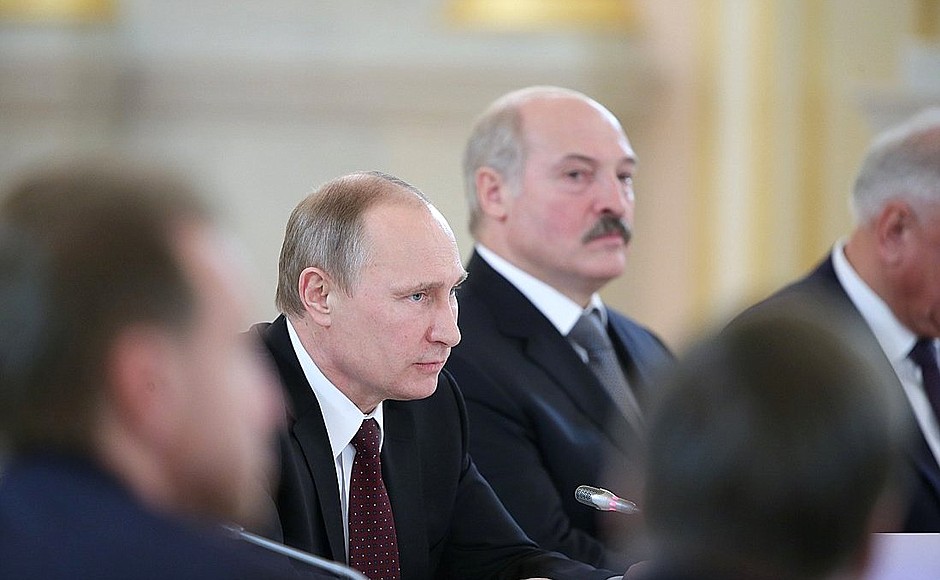
See also
President of Russia Vladimir Putin: Mr Lukashenko, colleagues,
Cooperation between Russia and Belarus within the Union State is the most advanced form of integration within the CIS. I fully support what Mr Lukashenko had to say in this respect.
Our joint activities within this framework have become more intensive. The active work of all the Union State bodies – the Council of Ministers, the Union Parliament and the Permanent Committee – has led to a substantive agenda for us. Among our top priorities are issues pertaining to the expansion of mutual investments, industrial cooperation and mutual trade.
“Cooperation between Russia and Belarus within the Union State is the most advanced form of integration within the CIS. The active work of all the Union State bodies – the Council of Ministers, the Union Parliament and the Permanent Committee – has led to a substantive agenda. Among our top priorities are issues pertaining to the expansion of mutual investments, industrial cooperation and mutual trade.”
In 2012, our trade turnover has reached a record $44 billion. This year the figures are somewhat lower, about $30 billion, but the growth rate is gradually catching up: in the third quarter of this year, trade grew by 3%. We expect it to reach about $39.5 billion by the end of the year.
According to the Eurasian Economic Commission, Belarus ranks first (leaving behind Ukraine) in Russia’s trade with the CIS states, and fifth in our trade with all of our major partners the world over, surpassed only by China, the Netherlands, Germany and Italy.
Russia, in turn, firmly retains its position as Belarus’ leading trade and economic partner (49% of its trade turnover) and principal investor in the republic’s economy.
The accumulated Russian capital investments amount to almost $6 billion — $5.8 billion, to be exact. These are primarily the most valuable investments – direct investments in the strategic sectors of Belarus economy: gas transportation, the processing industry, transport and communication.
There are over 2 thousand companies with Russian equity operating in Belarus, as was mentioned during our narrow format meeting by the Prime Minister of Belarus Mr Myasnikovich as we discussed current business.
Among the major high technology investment projects is the construction of a nuclear power plant in Belarus (total funding amounts to some $10 billion), the creation of the Rosbelavto holding on the basis of KAMAZ and MAZ auto plants, and the joint operation of EuroKhim and Grodno Azot.
“Parameters of the Union budget have been retained at a high level for 2014. The funds will be used to finance 37 joint programs and events.”
Cooperation with individual regions is becoming an ever more significant factor of growing economic ties. Leading in trade with Belarus among the various regions of Russia are Smolensk, Tyumen and Moscow regions. The Russian capital alone accounts for over $5 billion worth of trade with Belarus. We believe that our legislators have come up with a very timely initiative to establish a Russia-Belarus interregional forum. I believe my colleagues will touch upon this issue today as well.
The Union budget is a separate section on our agenda. Its parameters have been retained at a high level for 2014. The funds will be used to finance 37 joint programs and events, among them the advanced development of high tech integrated circuit chips and semi-conductor devices, the production of composite materials, projects related to long-distance Earth sounding. As you may see, these are all groundbreaking projects, extremely important for the economies of our nations, for the development of high technology production, and important for strengthening our joint defence capability.
We also intend, as it has been mentioned, to consider issues pertaining to ensuring equal social rights for our citizens. We are referring here to education, healthcare and pensions. We need to analyse the existing regulations and adapt them to current conditions, as necessary.
“We also intend to consider issues pertaining to ensuring equal social rights for our citizens. We are referring here to education, healthcare and pensions. We need to analyse the existing regulations and adapt them to current conditions.”
We consider it important to continue our close cooperation on the international arena. We have developed corresponding programs, and I am sure they will be implemented in the same fashion as before.
I would like to note the practical significance of other documents planned for execution, including interstate agreements on cooperation in information security and in combatting corruption.
I believe that in the course of our exchange we will set certain targets for the further development of integration between Russia and Belarus.
I am confident that our work today will be productive. Thank you for your attention.